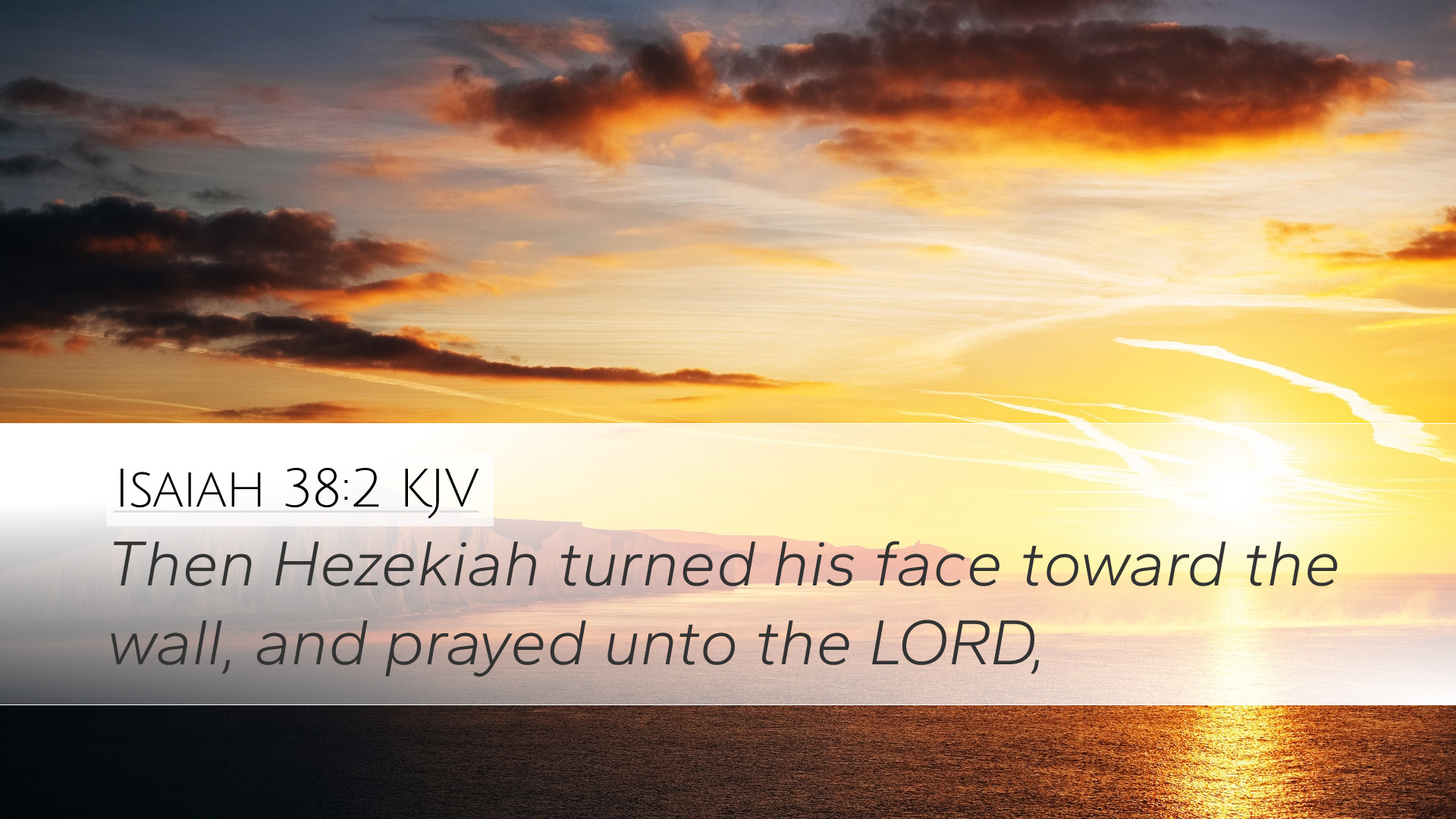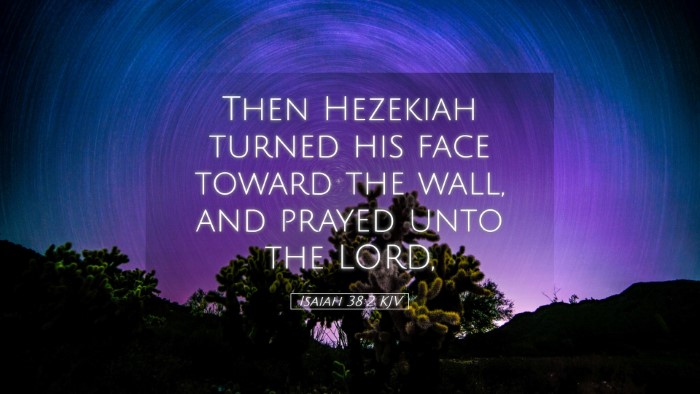Commentary on Isaiah 38:2
Text of Isaiah 38:2 (KJV): "Then Hezekiah turned his face toward the wall, and prayed unto the LORD."
Introduction
Isaiah 38:2 captures a pivotal moment in the life of King Hezekiah. Facing impending death due to a terminal illness, Hezekiah's response is significant not only for his personal journey but also for the theological implications it represents. Within this commentary, we shall delve into varying perspectives provided by notable public domain commentaries.
Contextual Background
The events surrounding this verse occur during a troubling time for Judah. Hezekiah, after initiating reforms, faces the grim news from the prophet Isaiah regarding his imminent death (Isaiah 38:1). This situation is compounded by the Assyrian threat looming over Jerusalem.
Hezekiah's Emotional State
Hezekiah's turning to the wall signifies his deep sense of despair and urgency. He is not merely presenting a prayer; he is engaging in an intimate act of supplication.
Insights from Commentators
-
Matthew Henry: In his commentary, Henry emphasizes that Hezekiah's actions reflect a fervent heart seeking God in distress. Turning to “the wall” symbolizes a desire for privacy and a sincere connection to God without distraction. He notes that such earnestness in prayer is commendable and urgent when faced with death.
-
Albert Barnes: Barnes suggests that the act of turning to the wall also has a symbolic meaning; it conveys the idea of separation from worldly concerns and focusing entirely on the divine. He is, in essence, surrendering himself to God’s will while seeking healing, demonstrating a critical God-centric attitude amid life's trials.
-
Adam Clarke: Clarke analyzes the significance of Hezekiah's prayer itself. He notes that it serves as a model for believers: the combinations of humility, sincerity, and faith that defined Hezekiah's plea reflect essential aspects of effective prayer. Clarke asserts that the king's action shows an acknowledgment of his own mortality and a request for mercy grounded in God’s covenant promises.
Theological Themes
This verse introduces several theological themes worth exploring:
1. The Nature of Prayer
Hezekiah's prayer illustrates the depth of human supplication. It is intensely personal, revealing that prayer is not a mere ritual but a heartfelt communication with God.
2. The Sovereignty of God
The circumstances surrounding Hezekiah's illness raise questions about divine sovereignty and human agency. His prayer acknowledges this relationship, demonstrating that while God governs all things, human response to His will is essential.
3. God’s Mercy and Healing
Hezekiah's plea for life is laced with an understanding of divine mercy. This passage foreshadows themes of healing that resonate throughout Scripture, culminating in Christ’s own ministry of restoration.
Application for Today
Pastors, students, and theologians can draw several applications from Isaiah 38:2:
-
Authenticity in Prayer: Believers are encouraged to approach God with authenticity, fully expressing their fears, hopes, and desires, much like Hezekiah.
-
Courage in Crisis: The act of turning to God in moments of crisis can be a source of strengthening faith. Believers are called to remember that it’s through trial that faith is often sharpened.
-
Remembering God’s Promises: Hezekiah’s reflection on his service to God as a basis for his request underscores the importance of believers reminding God of His promises in prayer, not as manipulation but as a statement of faith.
-
Community of Prayer: While Hezekiah prays alone, the precedent for communal prayer in times of trouble is also vital for today’s churches. Collective prayer can yield tremendous results.
-
Hope and Healing: Hezekiah’s experience serves as a powerful reminder that there is hope in prayer and that God is attentive to the cries of his people.
Conclusion
Isaiah 38:2 is rich with insights about the nature of prayer, the character of God, and the human condition. Commentators like Matthew Henry, Albert Barnes, and Adam Clarke provide profound reflections that underscore the importance of sincere prayer, the recognition of God's sovereignty, and the desire for divine intervention. For modern-day believers, Hezekiah’s example encourages us to turn our faces to God in times of trouble, reminding us that, indeed, God hears our prayers.


